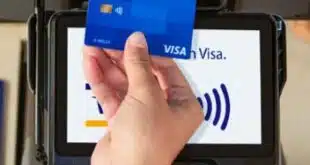Mastercard Inc. is the latest U.S. payments company to take initial steps to operate in China with Tuesday’s announcement it will form a joint venture with NetsUnion Clearing Corp. to establish a domestic bank card clearing entity.
The entity formed from the joint venture—Mastercard NUCC Information Technology (Beijing) Co. Ltd.—received in-principle approval from the People’s Bank of China. Mastercard says within a year the joint venture will be able to apply to the bank for formal approval to begin clearing transactions.
Mastercard welcomed the bank’s decision. “We are delighted and encouraged by this latest decision from the PBOC,” Ajay Banga, Mastercard president and chief executive, said in a statement. “China is a vital market for us and we have reiterated our unwavering commitment to helping drive a safer, more inclusive and seamless payments ecosystem for Chinese consumers and businesses. We remain focused on working with the Chinese government and local partners to grow the overall payments infrastructure.”

NetsUnion operates a national payments network in China that works with non-bank firms, including Chinese payments giant Alipay. The People’s Bank of China, in its most recent Payment System report, for the second quarter of 2019, said there were almost 8 billion bank cards in use, of which 7.3 billion were debit cards. For the same period, more than 25 million merchants and 38.9 million point-of-sale terminals were connected to the interbank bank card payment system.
The Mastercard/NetsUnion joint venture is another step for U.S.-based payment networks to expand into China, says Krista Tedder, director of payments at Javelin Strategy & Research, a Pleasanton, Calif.-based research firm.
“The need to create a clearing and settlement engine in China requires a partnership to meet Chinese regulatory monetary standards,” Tedder says in an email to Digital Transactions News. “We won’t see Mastercard payments immediately in China, but this is a big step forward. U.S. payment companies are interested in participating in the Chinese economy and the scale that the population brings. In addition China has been aggressively expanding services, infrastructure, and technology across Asia Pacific which would provide Mastercard an even deeper foothold in the region.”
The news is a bit of a coup for Mastercard, says Gilles Ubaghs, senior analyst at Boston-based Aite Group LLC. “For Mastercard, the move is a coup against Visa and others in accessing the Chinese market,” Ubaghs says. “But this is still early stages, and it’s likely the devil will prove to be in the details of any finalized deal. Alongside this, UnionPay and cards in general are widespread but not as widely used as mobile payments are today, and gaining access to the mobile market will likely prove the ultimate end goal. As Mao put it ‘A journey of a thousand miles starts with a single step’ and this is definitely an early step.” China UnionPay is the predominant card network in China.
Mastercard is the latest U.S. payments company to strike a deal to operate in China. It joins PayPal Holdings Inc., American Express Co., Discover Financial Services, and Global Payments Inc. Most recently, PayPal acquired a majority stake in China’s Guofubao Information Technology Co. Ltd., better known as Gopay. PayPal won the right to be the first foreign company to directly offer online payments in China.
In 2018, AmEx got the OK to process domestic transactions in China, an approval that AmEx said enabled it to be first foreign payments network allowed to build a network in mainland China. Mastercard’s announcement comes as the United States and China reached a trade agreement that provides a path for U.S. payment companies to operate without requiring a local Chinese partner.





